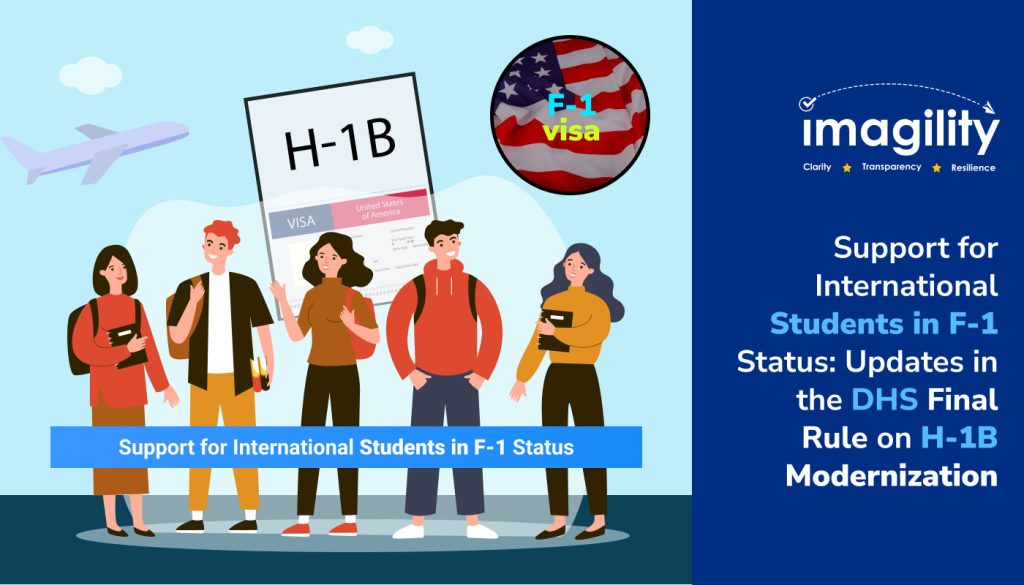The U.S. Department of Homeland Security (DHS) has announced key updates to the H-1B visa program aimed at improving the transition process for international students. As part of its ongoing modernization efforts, the new rule, announced on December 18, 2024, will come into effect on January 17, 2025, providing much-needed flexibility for F-1 students awaiting H-1B status.
Understanding the F-1 Cap-Gap Provision
The F-1 cap-gap provision bridges the gap between the expiration of a student’s F-1 status and the start of their H-1B nonimmigrant worker status, which begins on October 1. This provision ensures that F-1 students with a pending or approved H-1B visa petition can remain in the U.S. legally and continue working or studying during the transition period. The cap-gap typically applies after the expiration of OPT (Optional Practical Training) or a STEM OPT extension.
Enhancements in the New Rule
The updated rule extends the cap-gap period and introduces several new measures to ensure uninterrupted legal status and work authorization:
- Automatic Extension of F-1 Status
Under the updated provisions, F-1 students transitioning to H-1B will have their F-1 status and any employment authorization automatically extended until April 1 of the relevant fiscal year. - Minimized Disruptions
By safeguarding students from lapses in legal stay or employment authorization, the rule eliminates the uncertainties caused by delays in H-1B processing. - Support for STEM OPT Graduates
This change reinforces the benefits for STEM OPT participants, enabling employers to retain these highly skilled graduates during the transition to H-1B status.
Benefits for Students and Employers
This modernization offers notable advantages to both students and employers. For students, the rule provides job security and legal status continuity during the transition to H-1B. The automatic extension ensures that students can stay employed without interruptions, supporting their professional growth and contribution to the workforce.
Employers also benefit from these changes by retaining top international talent without fearing gaps in employment authorization. Operational continuity is enhanced, as employers no longer face disruptions due to the potential loss of skilled employees during status transitions.
Navigating the Cap-Gap Period
It is essential for both students and employers to understand the updated cap-gap provisions:
- Automatic Application
The automatic extension of F-1 status applies to students whose H-1B petitions are filed and accepted under the regular or advanced degree exemption cap. This means that eligible students do not need to take additional steps to apply for this extension, as it is granted automatically upon the timely filing of the H-1B petition. - Extended Duration
The extended duration of work authorization under OPT/STEM OPT now lasts until April 1 of the fiscal year for which the H-1B petition is filed. This is a significant change from previous regulations, which ended the cap-gap work authorization on September 30 of the prior fiscal year. This extension ensures that there is no interruption in employment for eligible students during this transition period. - Transition to H-1B
Students must complete their transition to H-1B status by October 1 of the fiscal year. However, it is important to note that while the H-1B petition can request a start date later than October 1, it cannot be more than six months after the petition filing date. The student must maintain their F-1 status until that transition occurs.
Conclusion
The DHS’s new rule marks a significant step toward supporting international students as they transition to the U.S. workforce. By extending the cap-gap period, automatically extending F-1 status, and safeguarding work authorization, it paves the way for smoother transitions and enhances opportunities for both students and employers.
With these updates effective from February 2025, stakeholders should stay informed to fully utilize the benefits and navigate the changes effectively.
Related Resources
H-1B Program Modernization: A Summary of the DHS Final Rule
A Sneak Peak Into Beneficiary-Centric H-1B Selection Process
Ensuring Compliance with DHS Site Visit Rules in the H-1B Program Modernization









